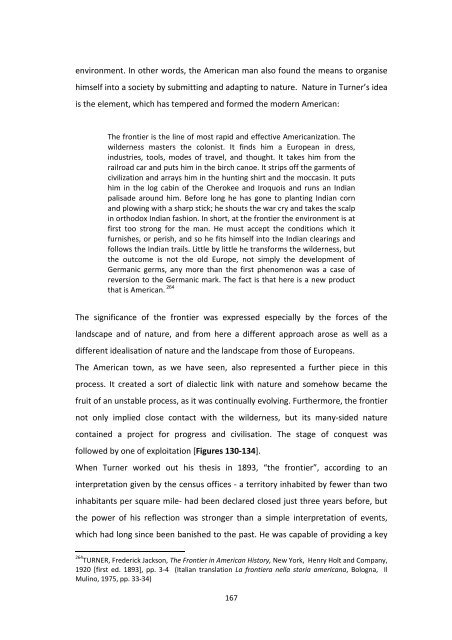building the american landscape - Univerza v Novi Gorici
building the american landscape - Univerza v Novi Gorici
building the american landscape - Univerza v Novi Gorici
You also want an ePaper? Increase the reach of your titles
YUMPU automatically turns print PDFs into web optimized ePapers that Google loves.
environment. In o<strong>the</strong>r words, <strong>the</strong> American man also found <strong>the</strong> means to organise<br />
himself into a society by submitting and adapting to nature. Nature in Turner’s idea<br />
is <strong>the</strong> element, which has tempered and formed <strong>the</strong> modern American:<br />
The frontier is <strong>the</strong> line of most rapid and effective Americanization. The<br />
wilderness masters <strong>the</strong> colonist. It finds him a European in dress,<br />
industries, tools, modes of travel, and thought. It takes him from <strong>the</strong><br />
railroad car and puts him in <strong>the</strong> birch canoe. It strips off <strong>the</strong> garments of<br />
civilization and arrays him in <strong>the</strong> hunting shirt and <strong>the</strong> moccasin. It puts<br />
him in <strong>the</strong> log cabin of <strong>the</strong> Cherokee and Iroquois and runs an Indian<br />
palisade around him. Before long he has gone to planting Indian corn<br />
and plowing with a sharp stick; he shouts <strong>the</strong> war cry and takes <strong>the</strong> scalp<br />
in orthodox Indian fashion. In short, at <strong>the</strong> frontier <strong>the</strong> environment is at<br />
first too strong for <strong>the</strong> man. He must accept <strong>the</strong> conditions which it<br />
furnishes, or perish, and so he fits himself into <strong>the</strong> Indian clearings and<br />
follows <strong>the</strong> Indian trails. Little by little he transforms <strong>the</strong> wilderness, but<br />
<strong>the</strong> outcome is not <strong>the</strong> old Europe, not simply <strong>the</strong> development of<br />
Germanic germs, any more than <strong>the</strong> first phenomenon was a case of<br />
reversion to <strong>the</strong> Germanic mark. The fact is that here is a new product<br />
that is American. 264<br />
The significance of <strong>the</strong> frontier was expressed especially by <strong>the</strong> forces of <strong>the</strong><br />
<strong>landscape</strong> and of nature, and from here a different approach arose as well as a<br />
different idealisation of nature and <strong>the</strong> <strong>landscape</strong> from those of Europeans.<br />
The American town, as we have seen, also represented a fur<strong>the</strong>r piece in this<br />
process. It created a sort of dialectic link with nature and somehow became <strong>the</strong><br />
fruit of an unstable process, as it was continually evolving. Fur<strong>the</strong>rmore, <strong>the</strong> frontier<br />
not only implied close contact with <strong>the</strong> wilderness, but its many‐sided nature<br />
contained a project for progress and civilisation. The stage of conquest was<br />
followed by one of exploitation [Figures 130‐134].<br />
When Turner worked out his <strong>the</strong>sis in 1893, “<strong>the</strong> frontier”, according to an<br />
interpretation given by <strong>the</strong> census offices ‐ a territory inhabited by fewer than two<br />
inhabitants per square mile‐ had been declared closed just three years before, but<br />
<strong>the</strong> power of his reflection was stronger than a simple interpretation of events,<br />
which had long since been banished to <strong>the</strong> past. He was capable of providing a key<br />
264 TURNER, Frederick Jackson, The Frontier in American History, New York, Henry Holt and Company,<br />
1920 [first ed. 1893], pp. 3‐4 (Italian translation La frontiera nella storia <strong>american</strong>a, Bologna, Il<br />
Mulino, 1975, pp. 33‐34)<br />
167
















